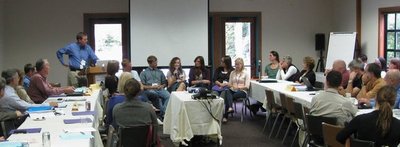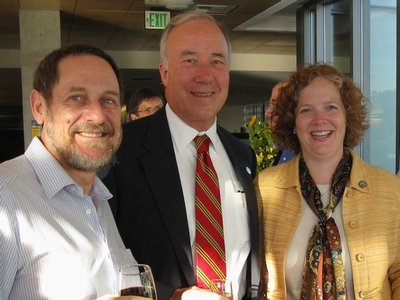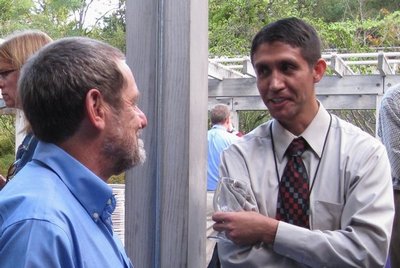September 30, 2010
School of Medicine hosts Walker-Ames Scholar Dr. Roger Strasser, a global leader in rural physician training
Dr. Roger Strasser, founding dean of the Northern Ontario School of Medicine (NOSM), visited the UW School of Medicine this month to discuss the training of physicians for rural and medically underserved areas. He was one of the Walker-Ames Scholars chosen annually by the UW Graduate School selection committee.
Strasser founded the NOSM in 2002 with a social mission that the school would produce rural physicians for Northern Ontario. The school and its students are strongly engaged with communities in the upper reaches of the province. The school has now graduated two classes. In 2009, 70 percent of the graduating students chose family medicine residency training. Most of them aim to return to rural areas. Other graduates chose primary-care specialties such as general internal medicine, general pediatrics and general surgery. In 2010 about 60 percent of NOSM graduates choose careers in family medicine. Graduates also successfully matched in subspecialties, had above average national board scores and scored higher than graduates of any other Canadian medical school in clinical decision making.
Strasser met with many local groups to discuss the similarities and differences of his program compared to the UW School of Medicine’s Target Rural Underserved Track (TRUST).
TRUST marks a concerted effort to bring many of the UW medical school’s successful rural and medically underserved physician training efforts under one program with a separate admissions process. The program supports and encourages students interested in a career of service. It also works with communities to identify and promote their needs and resources for health workforce training.
The groups meeting with Strasser talked about community engagement, working with rural students to interest them in medical school at a young age, how medical school admissions selects the students most likely to return to rural or urban underserved practices, and offering these medical students clinical training that emphasizes longitudinal, integrated clerkships in rural areas. An example is the medical school’s WWAMI Rural Integrated Training Experience (WRITE). WRITE participants spend 20 weeks at one clinical teaching site. They train with preceptors who care for populations that otherwise would lack access to health care, due to their geographical location or due to language, economic or cultural barriers.
Medical students completing the WRITE program get credit for their required family medicine clerkship, and earn other credits toward requirements in internal medicine, pediatrics, psychiatry and their elective clinical training. They have learned to provide continuity of care by seeing some of the same patients or families over several months.
During his visit, Strasser met with Family Medicine Residency Network directors, Washington Academy of Family Physicians leaders, and individual School of Medicine faculty members. Strasser was a keynote speaker for the WRITE/TRUST meeting and WRITE orientation Sept. 12, which also featured a talk on health-care reform legislation by Ted Epperly, director of the Family Medicine of Idaho residency program in Boise and immediate past president of the American Academy of Family Physicians.
Strasser later participated in the School of Medicine AWARE Retreat — a Sept. 13 gathering of faculty throughout the five-state region who help train UW medical students.
The TRUST program had its start in Montana with initial funding from the Montana Area Health Education Centers and others. The program is now entering its third year. For the 2011 entering medical school class, 15 TRUST students will be selected by a separate admissions process. Five will train in Montana and 10 in eastern and western Washington. Other states in the medical school’s regional partnership are interested in joining the program.
Regional leaders of the UW School of Medicine Jay Erickson and John McCarthy have played key roles in getting TRUST started in Montana and Washington, respectively. Erickson, who lives in Whitefish, Mont., is the assistant clinical dean for WWAMI Montana, and John Mc Carthy, who lives in Spokane, is the assistant clinical dean for WWAMI Eastern and Central Washington.
WWAMI is an acronym for the five states –Washington, Wyoming, Alaska, Montana, and Idaho — that participate in the UW School of Medicine’s regional medical education program.
Suzanne Allen, vice dean for regional affairs at the UW School of Medicine and Tom Greer, professor of family medicine, are co-directors of TRUST. Jaime Grocock is the TRUST program coordinator.
The UW Walker-Ames Fund was established in 1936 by a bequest from the estates of Maud Walker-Ames and Edwin Gardner Ames. Since 1936, the fund has been used to bring many outstanding scholars in the academic profession to the UW campus. These scholars present public lectures about their respective fields of expertise and also work with groups of faculty and graduate students during their stay. The UW Graduate School administers the Walker-Ames Fund.
For more information on TRUST or Strasser’s visit, please visit the TRUST website





